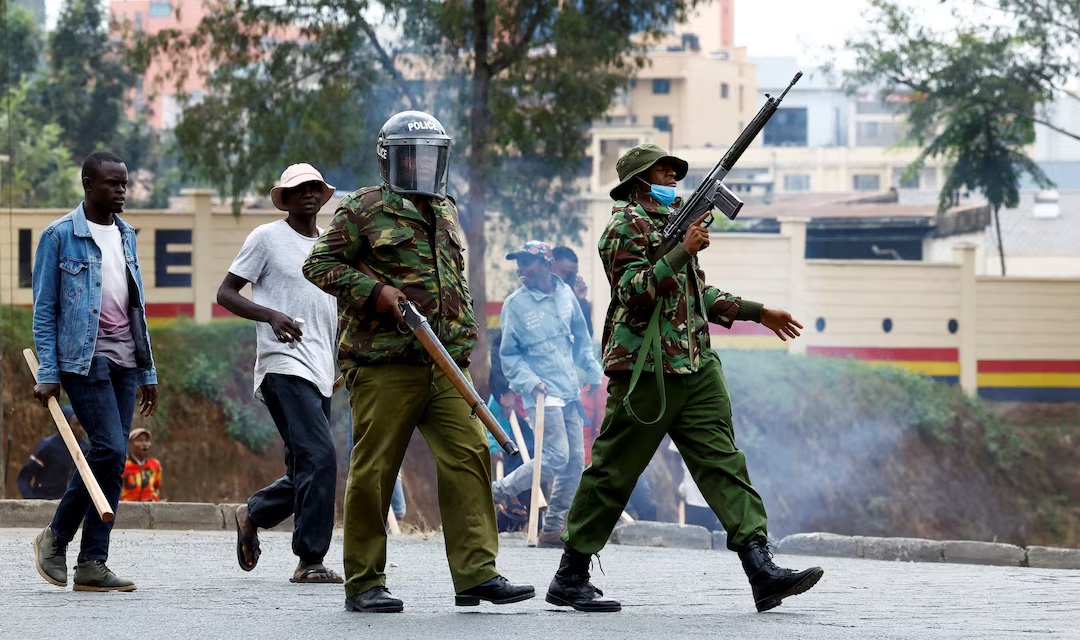Kenyans gathered under tight security across cities on Wednesday to mark the one-year anniversary of the historic anti-government protests that shook the nation in 2024.
What began last year as a movement against unpopular tax hikes escalated into nationwide unrest, culminating in the storming of Parliament and the deaths of over 60 people.
Though the demonstrations eventually subsided after President William Ruto withdrew the controversial tax proposals, public outrage over police brutality has remained intense.
That anger has surged again in recent weeks following the death of 31-year-old blogger and schoolteacher Albert Ojwang while in police custody.
His case has become a powerful symbol of the unresolved grievances left in the wake of last year’s deadly crackdown.
On Tuesday, six individuals, including three police officers, were formally charged with Ojwang’s murder.
All have pleaded not guilty.
His death, which was initially dismissed by authorities as a suicide, was later confirmed through an autopsy to be the result of a violent assault.
President Ruto has since admitted that Ojwang “died at the hands of the police,” calling the incident “heartbreaking and unacceptable.”
Across Nairobi, police in full riot gear blocked roads and controlled access to the city center, with eyewitnesses describing tense but mostly peaceful scenes.
The Ministry of Interior issued stern warnings to protesters, cautioning them not to provoke law enforcement or attempt to breach secured government zones.
The current demonstrations echo the trauma of June 25, 2024, when video footage showed police opening fire as demonstrators forced their way past barricades into the parliamentary complex.
That day marked one of the most severe crises of President Ruto’s administration and drew sharp criticism from both domestic and international observers.
Ahead of Wednesday’s march, a coalition of Western embassies, including the United States, the United Kingdom, and Canada, issued a joint statement urging Kenyan authorities to allow peaceful demonstrations and condemning the use of violence.
“The use of plainclothes officers in unmarked vehicles erodes public trust,” the statement read, referencing controversial tactics used by security agencies during previous protests.
Human rights groups have also raised alarms about the presence of unidentified individuals at protest sites.
In recent weeks, reporters observed groups of men armed with sticks and whips attacking demonstrators.
Activists claim this tactic is designed to intimidate and discredit the protest movement.
These men, some of whom call themselves “patriots,” deny being hired enforcers and claim they are simply protecting property from looters.
Kenya’s foreign affairs ministry responded to international criticism with a measured statement.
It emphasized that any abuse of power by police would be addressed through legal and institutional channels.
“Diplomatic partnerships flourish best in mutual respect,” the ministry noted, “and with recognition of each other’s unique governance contexts.”
Despite those reassurances, trust in the government and police remains fragile.
Last week, two officers were arrested for the fatal shooting of an unarmed civilian during a demonstration linked to Ojwang’s death.
This rare act of accountability that some see as a positive step, but many regard with skepticism.
For many Kenyans, particularly the youth, this anniversary is not just a memorial.
It is a call to continue demanding accountability, dignity, and reform.
Alongside vigils and marches, hashtags calling for justice have trended online, reflecting a generation increasingly unwilling to stay silent in the face of repression.
As the country reflects on a turbulent year, Kenya stands at a critical juncture.
They stand between the promise of peaceful democratic expression and the danger of sliding further into authoritarian responses to dissent.



